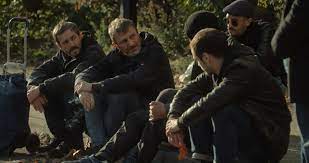282 total views, 1 views today
The Temple Woods Gang 2023 Movie Review
With seven features to his name, Franco-Algerian director Rabah Ameur-Zaïmeche still remains relatively unknown to art-house moviegoers both at home and abroad.
And yet, ever since his 2001 debut, Wesh, Wesh, What’s Happening?, he’s been one of the most fascinating and consistently surprising auteurs to emerge from France these past two decades. Each new film, whether set in the present (Adhen) or past (The Smugglers’ Songs), the Paris banlieue (Wesh, Wesh) or an Algerian village (Bled Number One), adds something original to a body of work that is a perpetual experiment in narrative cinema, blurring the lines between fiction, documentary, reality, fantasy and history in ways few directors currently do.
His latest, The Temple Woods Gang (Le Gang des Bois du Temple), is ostensibly a crime thriller, with an English title that sounds like an old Western and a French title like that of an unreleased Wu-Tang Clan album. In many ways, the film follows the typical genre template, tracking a band of thieves from the titular housing project — the Bois du Temple, located just north of Paris in Clichy-sous-Bois — as they plan, execute and then severely pay the price for robbing a powerful Middle Eastern prince.
But that’s just the story. What makes Zaïmeche’s work feel so fresh and intriguing is the way he uses plot as a means to explore other things, whether it’s improvising with a cast that mixes amateur and professional actors or making moments of fiction feel completely real, as if he had captured them on the fly. His films are also subtly, and sometimes overtly, political — especially about the limited place French society offers people, such as the director himself, of African or North African origin who grew up in the banlieue.
That theme is very much at the center of The Temple Woods Gang, whose plot was inspired by a real incident that occurred in 2014 on the outskirts of Paris, when a gang of criminals robbed a Saudi convoy en route to a private jet. The same thing happens here, with small-time thief Bébé (Philippe Petit) and his five buddies (Kenji Meunier, Salim Ameur-Zaïmeche, Kamel Mezdour, Nassim Zazoui and Rida Meszdour) from Bois du Temple teaming up to take down the SUV of a filthy rich prince (Mohamed Aroussi) and his local fixer (Lucius Barre).
The gang’s story is bookended by that of their neighbor, Monsieur Pons (Régis Larcoche), a former army sniper from the same housing project who lives in the apartment of his mother, whose death opens the movie and then hovers over it like a bad omen. As boys from the hood, Pons and the robbers seem to go way back, exchanging niceties whenever they run into each other on the street or in a bar. Eventually their paths will cross in explosive ways that are not worth spoiling, but suffice to say that the former’s skills as an expert marksman will come in handy at some point.
The highway heist pulled off by Bébé and his gang goes off smoothly enough, but after that it’s all downhill. Like the wave of blood that slowly washes over Macbeth after he kills the king, the vengeance enacted by the prince, who’s hoping to recover classified documents that were stolen along with all his cash, is gradual and gruesome. It’s already way too late when the gang realizes they’ve been playing out of their league the entire time, and what began as a thrilling robbery ends in murder and regret.
Zaïmeche captures the violence in short, jarring bursts of adrenaline, while sympathetically portraying the robbers as misguided men from a tough place, hoping to make better lives for themselves and their families. They’re clearly no match for the wealth of the prince, which is far-reaching and unstoppable, requiring only a few phone calls to be put into action. As his loyal Paris-based fixer, Barre — who’s better known as an international film publicist and former press attaché for Cannes — downplays his role, delivering kill orders with a kind and calm demeanor as if they were no big deal.
The moral of The Temple Woods Gang is bleak indeed: Crime doesn’t pay and capitalism usually wins in the end. The film is haunting and creeps along slowly — perhaps too slowly for some — arriving at a conclusion that seems inevitable, including the trajectory of the neighbor, Pons. And yet Zaïmeche fills his narrative with quiet moments of bliss as if stolen from real life, whether it’s the guys gathering at a café counter, reading a bedtime story to their children or celebrating the early success of their stick-up.
There are two standout scenes that are above all worth mentioning, each of them involving live music: The first is at the funeral of Pons’ mother, where an older woman (played by real-life singer Annkrist) belts out a heartbreaking song that echoes throughout the cathedral. The second is a late sequence where Pons follows the prince to a nightclub, watching as the latter suddenly gets up on stage, takes off his turban and does a mesmerizing, macabre dance during a concert by Algerian Raï artist Sofiane Sadi.
Zaïmeche lets those scenes play out in their entirety, usurping plot and dialogue to focus on the beauty of the performances, which only serve to enhance his film’s message. He’s found purely sensory means to convey the heaviness of death that reigns over The Temple Woods Gang from start to finish, and he does it in a way that feels both tragic and sublime.
